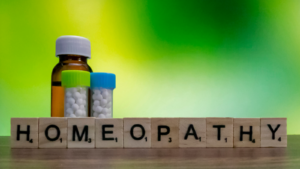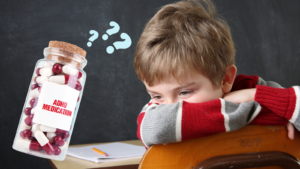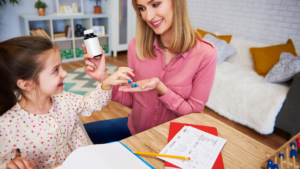Attention deficit hyperactivity disorder (ADHD) is one of the most common mental health issues in children and adults. People with ADHD experience problems staying focused, being attentive, displaying hyperactive-impulsive behaviors, or both. But how does ADHD affect memory?
Children with ADHD struggle with executive functions. Executive functioning refers to one's mental skills, including flexible thinking, self-control, and working memory. These are all necessary ADHD coping skills to learn, work, and manage one’s life.
You must develop executive functions to plan and prioritize future tasks or events. These executive functions enable you to start and complete tasks separate from intelligence. So, you can be a bright child but never get organized enough to complete anything. Working memory is one of the foundational executive functions.
One 2020 study showed that kids with ADHD have lower working memory capacities than children without the condition (Kofler et al., 2020). Therefore, parents should learn the link between ADHD and memory to understand their child's daily struggles and use executive functioning skills training to improve them.
Can ADHD Affect Memory?
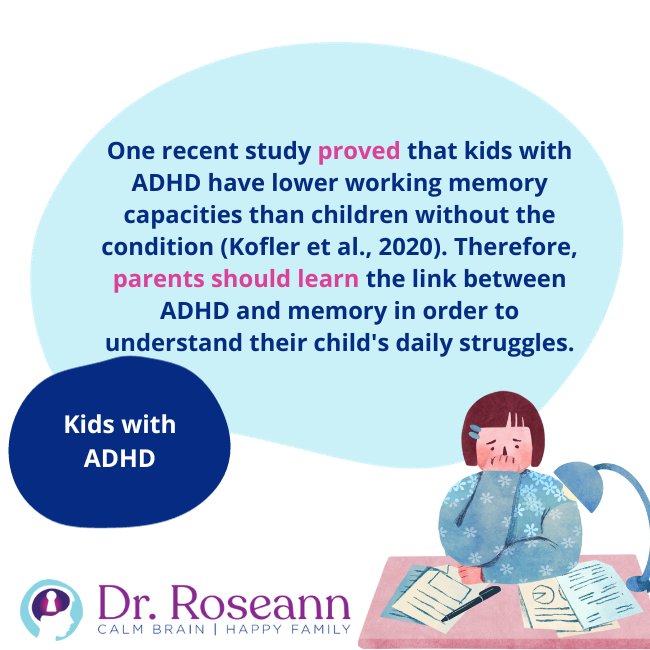
Memory is vast and complex. One’s memory system categorizes information by amount, type, and various characteristics, such as verbal, auditory, or kinesthetic.
ADHD may affect a child's memory differently, as attention is a prerequisite for memory. In other words, you simply can’t pay attention without focus. It interferes with their cognitive processes as certain brain areas do not function well. Depending on the severity of ADHD symptoms in your child, they may have long-term, short-term, or working memory difficulties. Here's how ADHD impacts certain types of memory.

ADHD and Long-Term Memory
Long-term memories are those that you keep in your mind for an extended time. It is what we refer to as lasting memories. For example, if you recall how you spent your summer three years back, you're using your long-term memory. Your long-term memory can store information for extended periods.
Previous studies show issues with long-term memory in people with ADHD. These memory difficulties can impact children as they learn in school or at home. Although researchers made this study on adults, parents should be very concerned about it, too, as their kids will carry these issues as they grow older.
Previous research suggests that the subject’s significant problems with long-term memory are related to memory acquisition issues. That means transferring information from short-term or working memory into long-term storage. The long-term memory deficits observed in adults with ADHD are related to the learning deficit observed from the encoding stage (Skodzik et al., 2016).
Encoding refers to the initial step of memory creation. It's when the brain tries to understand why something has happened or tries to give meaning to certain experiences. As a result, the brain retains important information better. We remember things most when there's a purpose associated with them.
ADHD children don't do very well on tests that check their long-term memory functions because their brains process information differently. Distractions are prevalent in children with ADHD as it prevents them from taking in and organizing information the right way. It indicates that a child's long-term memories are not lost but not made at all.
When Jana came to me, she complained of forgetfulness and poor test grades. After assessing her, it was clear that Jana had ADHD. She had a history of “zoning out” and “daydreaming.” Jana did well on memory tasks when she was first given a moment to alert and then time to memorize.
Her distractability and difficulties concentrating were what got in the way of her performance on tests. During her executive functioning skills training, we focused on teaching Jana how to alert her brain before taking the information, which became much easier after brain training with neurofeedback.
ADHD and Short-Term Memory
The brain stores short-term memory in the prefrontal cortex and holds it there for a minute. Short-term memory is closely associated with working memory and is considered a part of it. Working memory consists of central executive and short-term memory (Dovis et al., 2013).
Unlike short-term memory, working memory may go beyond a minute and last for hours. It holds multiple pieces of information that can help with problem-solving and task completion, among other things. Short-term memory is remembering a phone number long enough to dial it, and working memory is remembering it for a few hours so you can call to be picked up.
A deficiency in short-term memory is also a deficiency in working memory. But when compared side-by-side, deficits in short-term memory are usually less pronounced than the working memory deficit (Kofler et al., 2020). This further emphasizes the relationship between working memory and ADHD.
ADHD and Working Memory
Working memory is where the brain stores small amounts of information to perform cognitive functions. Think of it as that storage space in your brain where you keep any information that you need to retrieve fast. It is where you keep your thoughts, ideas, and facts, which you need as guidance for your actions and decisions.
Your working memory is what helps you complete a task at hand. For example, did you ever experience going to your bedroom to retrieve something but forget what when you got there? That's an example of a lapse in your working memory.
Any new information entering the working memory stays there for mere seconds. However, if a person is focused, it stays there longer. This is why kids and teens with ADHD tend to experience issues with their working memory because they aren’t always alert and engaged enough to hold onto information to move into working memory. As a result, it prevents them from completing daily tasks, particularly in school.
Kids with poor working memory may find it challenging to complete complex instructions. For example, if you ask a child with ADHD to pick up his toys, put them in a box, and put the box under the bed, he may not be able to follow, and you may think he’s being defiant.
In that example, most children with ADHD will do the first instruction and ignore the rest. Or they may miss the first part of an instruction and only hear the end. If parents don't understand what their child is going through, they may think they're being resistant or lacking motivation. But in truth, they have poor working memory. Their brain fails to process all those instructions and may feel lost.
Joann was so angry with her son Luca because she thought he was lazy and didn’t care about his grades when the reality couldn’t be further from the truth. Luca wanted to do well, but despite being bright, he didn’t have the skills to keep up with his schoolwork and daily tasks.
Joann could accept and work with Luca's strengths and challenges after a QEEG brain map and understanding how Luca’s brain worked. Together they moved forward with a new set of skills, and Luca was more consistent at school and home.
Aside from paying attention and following instructions, working memory lets one plan actions, organize activities, and create a schedule. It also allows them to stay on track and reach their goals.
If a child has ADHD, their working memory is underdeveloped. It's why they tend to struggle in their daily life in general. For example, they may be unable to do their assignments in school. At home, they may not be able to finish their chores.
Additionally, children with working memory deficiency may be oppositional or unmotivated because they always miss information, making them feel insecure and uncomfortable.
As a result, these kids find it challenging to function correctly despite trying very hard. That's the reason why some kids with ADHD exhibit frustration most of the time. It is likely where their behavioral problems and emotional outbursts originate.
Tips to Improve your Child's Memory
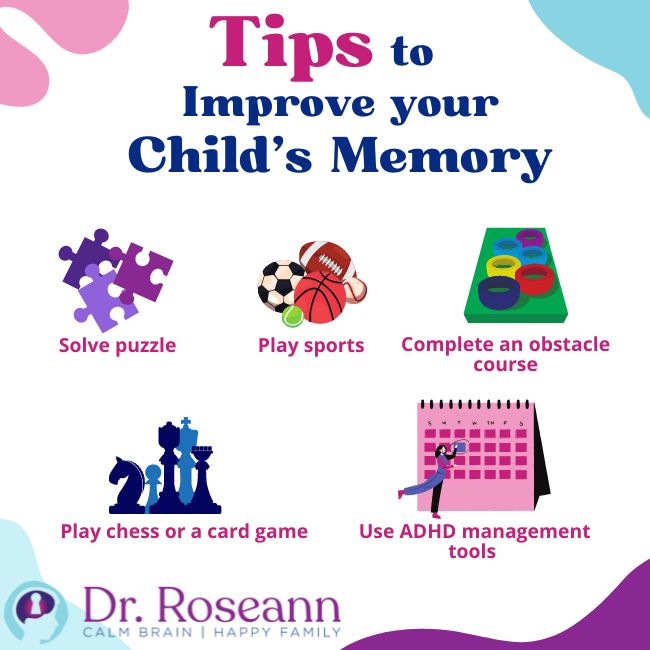
Brain exercises can help improve your child's working memory and executive functioning. Here is where brain games can help to increase alertness, focus, and energy. Like physical exercises, when the brain exercises daily, it improves or works more optimally.
Both physical and mental exercises can strengthen the brain’s ability to pay attention and learn. You can find various working memory games that will stimulate the flow of information in their brains and increase their memory capacity in the long run. Here are some of my favorite ways to optimize the brain and attention:
#1 Solve puzzles
While these memory challenges may look like simple games, puzzles increase one's attention, reasoning, and problem-solving skills. Look for puzzles involving pattern recognition, memorization, planning, math, and logic, which are all good for the brain. Puzzles also can be a great way to connect with others and learn how to win and lose.
#2 Play sports
Team sports are a challenge for children with ADHD as they need to pay close attention to what the team is doing so they can work in harmony with them. In addition, most sports require physical skills, mental coordination, and focused attention. You must understand where you are with others, which requires tremendous executive functioning skills.
#3 Complete an obstacle course
Obstacle courses promote quick thinking while moving, two actions that involve the body and brain. Kids must pay attention, be alert, problem-solve, plan, and act simultaneously when on an obstacle course. They are also fun, meet sensory needs, and are highly stimulating.
#4 Play chess or a card game
There are different kinds of card games, and most of them, if not all, involve strategizing. The same is true with chess. To win, you must play your hand well while trying to predict your opponent's actions. These games can help exercise your child's thinking and problem-solving skills.
#5 Use ADHD management tools
Children with ADHD likely get frustrated if they keep on forgetting important things. You can help them by giving them tools that will help them remember. For example, find apps or calendars that can track the date and time of their daily activities. It helps lower the anxiety and stress levels that they feel when they forget what they should do.
Ways to Protect Your Child's Memory
Untreated ADHD has many consequences, and memory loss is just one. Treating ADHD early on is beneficial for preventing memory problems, addressing forgetfulness, and reducing instances of brain fog.
As ADHD affects your child's memory, early detection and treatment are necessary, as over-relying on one’s intelligence can only get you so far. You need strong executive functioning skills to manage daily tasks and plan for all future tasks.
Getting an accurate ADHD diagnosis is the first step. Your child may have various reasons for having focus problems, and what he or she has may not automatically be ADHD. Find a healthcare professional to help rule out all the other causes and diagnose the condition correctly.
Here's the good news. We can help. At our Ridgefield Center, we treat ADHD in children who struggle with controlling their brains with neurofeedback to calm down and get them more alert and engaged.
These tools are all part of our BrainBehaviorReset™ Program, which we use to help kids and their parents manage ADHD behaviors. These science-backed natural treatments make it easier for them to learn, behave socially, and pay attention.
Magnesium is also an excellent supplement for ADHD as it helps kids with ADHD to focus more and be alert. This mineral gets depleted when the body gets stressed. Studies (Hoane, 2011) show magnesium is a critical nutrient for cognitive processing and memory.
Another study by Slutsky et al. (2010) found that increasing brain magnesium using a magnesium compound (Magnesium L-threonate, MgT) enhances learning abilities, working memory, and short- and long-term memory.
Therefore, magnesium supplements can help decrease anxiety, behavioral problems, and social problems. In addition, magnesium can calm the brain, improve memory, and reduce the core symptoms of ADHD.
We can guide you to science-backed solutions if you prefer natural solutions over stimulant medication. We’ll help you find the best solution for your child and ensure they get supported and treated with the most effective holistic methods. It may have been a long journey, but what's important is that you're at the right place now and just getting started.
Parent Action Steps
☐ Schedule a comprehensive evaluation with a qualified healthcare professional experienced in
☐ ADHD to assess your child's needs.
☐ Research and learn about available treatment options and benefits
☐ Regularly track your child's response to treatment and record any behavior, mood, or academic performance changes.
☐ Connect with support groups or other parents who have experience with ADHD to gain valuable insights and advice.
☐ Explore complementary approaches like a healthy diet and exercise to support your child's overall well-being and treatment outcomes.
☐ Be an active advocate for your child's needs at school and in the community to ensure they receive appropriate support and understanding.
☐ Take our Solutions Matcher to get personalized solutions for your child
Citations
Al-Saad, M. S. H., Al-Jabri, B., & Almarzouki, A. F. (2021). A Review of Working Memory Training in the Management of Attention-Deficit Hyperactivity Disorder. Frontiers in Behavioral Neuroscience, 15. https://doi.org/10.3389/fnbeh.2021.686873
Dovis, S., Van der Oord, S., Wiers, R. W., & Prins, P. J. M. (2013). What Part of Working Memory is Not Working in ADHD? Short-Term Memory, the Central Executive, and Effects of Reinforcement. Journal of Abnormal Child Psychology, 41(6), 901–917. https://doi.org/10.1007/s10802-013-9729-9
Hoane MR. The role of magnesium therapy in learning and memory. In: Vink R, Nechifor M, editors. Magnesium in the Central Nervous System [Internet]. Adelaide (AU): University of Adelaide Press; 2011. Available from: https://www.ncbi.nlm.nih.gov/books/NBK507270/
Kofler, M. J., Singh, L. J., Soto, E. F., Chan, E. S. M., Miller, C. E., Harmon, S. L., & Spiegel, J. A. (2020). Working memory and short-term memory deficits in ADHD: A bifactor modeling approach. Neuropsychology, 34(6). https://doi.org/10.1037/neu0000641
Slutsky, I., Abumaria, N., Wu, L. J., Huang, C., Zhang, L., Li, B., Zhao, X., Govindarajan, A., Zhao, M. G., Zhuo, M., Tonegawa, S., & Liu, G. (2010). Enhancement of learning and memory by elevating brain magnesium. Neuron, 65(2), 165–177. https://doi.org/10.1016/j.neuron.2009.12.02
Always remember… “Calm Brain, Happy Family™”
Disclaimer: This article is not intended to give health advice and it is recommended to consult with a physician before beginning any new wellness regime. *The effectiveness of diagnosis and treatment vary by patient and condition. Dr. Roseann Capanna-Hodge, LLC does not guarantee certain results.
Are you looking for SOLUTIONS for your struggling child or teen?
Dr. Roseann and her team are all about science-backed solutions, so you are in the right place!
Is it ADHD or something else?
Take the quiz to discover why your kid can’t focus, listen, or complete tasks. Empower yourself with natural solutions for your child's mental health and behavior.
You can get her books for parents and professionals, including It’s Gonna Be OK™: Proven Ways to Improve Your Child’s Mental Health, Teletherapy Toolkit™, and Brain Under Attack: A Resource For Parents and Caregivers of Children With PANS, PANDAS, and Autoimmune Encephalopathy.
If you are a business or organization that needs proactive guidance to support employee mental health or an organization looking for a brand representative, check out Dr. Roseann’s professional speaking page to see how we can work together.
Dr. Roseann is a Children’s Mental Health Expert and Therapist who has been featured in/on hundreds of media outlets including, CBS, NBC, FOX News, PIX11 NYC, The New York Times, The Washington Post, Business Insider, USA Today, CNET, Marth Stewart, and PARENTS. FORBES called her, “A thought leader in children’s mental health.”
She is the founder and director of The Global Institute of Children’s Mental Health and Dr. Roseann Capanna-Hodge, LLC. Dr. Roseann is a Board Certified Neurofeedback (BCN) Practitioner, a Board Member of the Northeast Region Biofeedback Society (NRBS), Certified Integrative Mental Health Professional (CIMHP) and an Amen Clinic Certified Brain Health Coach. She is also a member of The International Lyme Disease and Associated Disease Society (ILADS), The American Psychological Association (APA), Anxiety and Depression Association of America (ADAA) National Association of School Psychologists (NASP), International OCD Foundation (IOCDF) International Society for Neurofeedback and Research (ISNR) and The Association of Applied Psychophysiology and Biofeedback (AAPB).
© Roseann-Capanna-Hodge, LLC 2023




